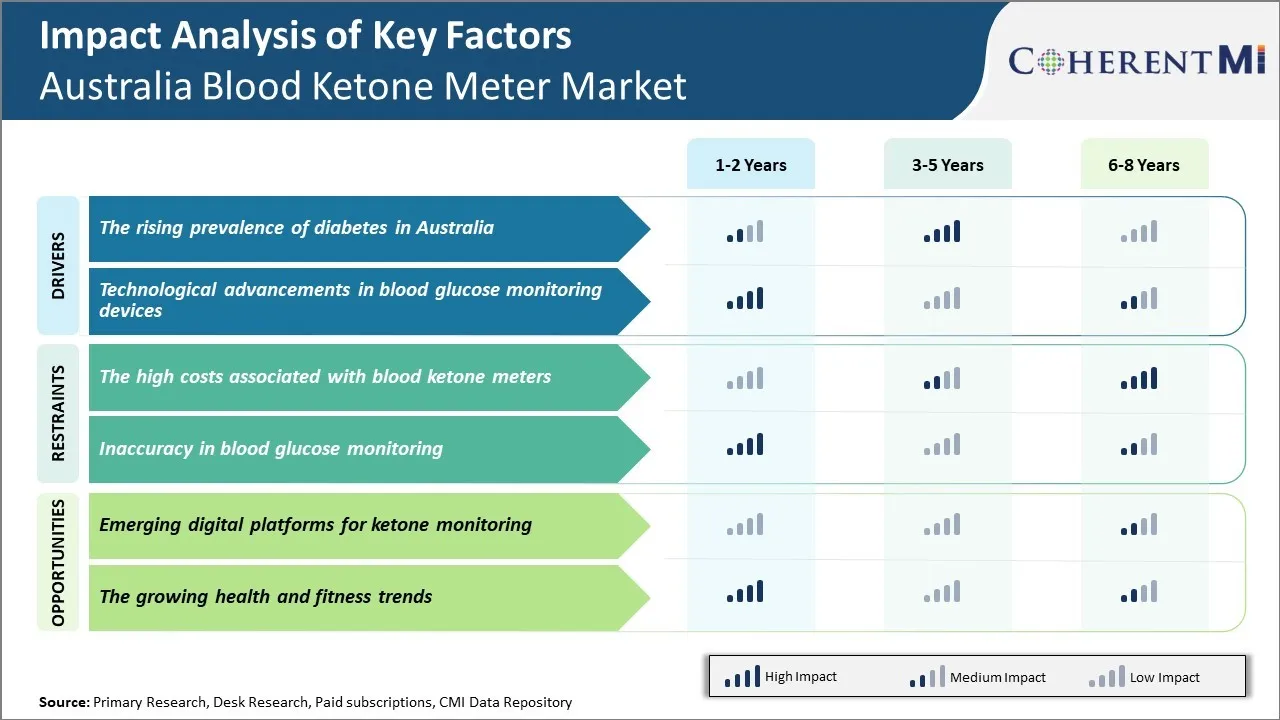Australia Blood Ketone Meter Market Trends
Market Driver – The Rising Prevalence of Diabetes in Australia
The increasing prevalence of diabetes in Australia has emerged as a major driver for the growth of the blood ketone meter market in the country. As per the recent data published by International Diabetes Federation, Australia currently has over 1.2 million adults suffering from diabetes, which is projected to increase to nearly 1.6 million cases by 2030.
Diabetes, if left uncontrolled, can lead to dangerous levels of ketones in the blood. Blood ketone testing helps diabetics closely monitor their body's response to insulin and carbohydrate intake, thereby preventing complications from ketoacidosis. Regular self-monitoring of blood ketones is recommended for all types of diabetes, especially for those following a ketogenic diet or experiencing diabetic ketoacidosis. Many Australians with Type 1 and Type 2 diabetes rely on point-of-care blood ketone meters to easily check their ketone levels at home or while traveling.
The gradual rise in the prevalence of diabetes and adoption of ketogenic diets has prompted more individuals to regularly track their ketone levels. This has significantly boosted the demand for affordable and accurate blood ketone monitoring devices across Australia in the last few years.
Market Driver – Technological Advancements in Blood Glucose Monitoring Devices
Technological advancements in blood glucose monitoring devices are having a profound impact on driving the growth of Australia's blood ketone meter market. Conventional blood glucose monitoring devices require pricking of fingers for drawing blood samples multiple times a day. However, continuous glucose monitoring (CGM) devices now available use small flexible filaments inserted just under the skin to measure glucose levels every few minutes without requiring finger pricking. CGM devices provide real-time alerts about high and low glucose levels through connected mobile applications. This significantly improves diabetes management for patients, as well as their quality of life. According to the Australian Institute of Health and Welfare, between 2020-2023, the incidence rate of diagnosed diabetes has risen sharply by almost 15% in Australia.
Ketone meters are gaining prominence as they can detect ketones in blood easily at home, serving as an early warning sign for diabetic ketoacidosis - a potentially life-threatening complication of diabetes. Blood ketone meters measure beta-hydroxybutyrate (BHB) levels and instantly display the results on their screens without needing additional lab tests.

Market Challenge – The High Costs Associated With Blood Ketone Meters
The high costs associated with blood ketone meters are posing significant restraints on the growth of Australia's blood ketone meter market. Blood ketone meters require ketone test strips to function, and these test strips are single-use consumables that must be regularly replenished. Unfortunately, the costs of both the meters and the ongoing test strips are quite steep for many individuals. On average, a blood ketone meter will cost around $50-80 upfront. Meanwhile, bundles of 50 test strips commonly retail for $30-60. For someone regularly testing their ketone levels, this can amount to $600-1000 or more spent annually just on test strips alone.
The high recurring costs pose a notable financial barrier to market adoption and expansion. Many potential users in Australia simply cannot justify expending such large sums regularly for monitoring their ketone levels. This is especially true as ketogenic diets/lifestyles remain a niche approach. Only a small subset of the population actively follows a ketogenic way of eating long-term. For most others, the value proposition of frequent ketone monitoring is questionable when weighed against the high price tag.
Market Opportunity – Emerging Digital Platforms for Ketone Monitoring
Emerging digital platforms for ketone monitoring present a major opportunity for growth in the Australian blood ketone meter market. With increasing focus on health and wellness in recent years, more Australians are following ketogenic or low-carb diets which promote fat burning over carbohydrate metabolism. This raises demand for easy and accurate means to monitor ketone levels in the body through blood testing.
Traditional blood ketone meters require finger pricks to draw blood for analysis. While effective, this process can be inconvenient and painful, creating a barrier to frequent at-home testing. Digital platforms overcome this issue by allowing users to transmit ketone readings from the meter to a companion smartphone app or online portal via Bluetooth. This provides a completely non-invasive way to track ketone levels over time from the convenience of one's mobile device. With the ability to seamlessly log readings, set targets and goals, and share data with care providers if needed, digital platforms enhance the user experience and utility of blood ketone monitoring.